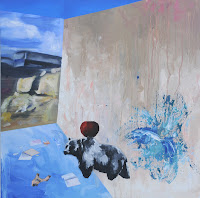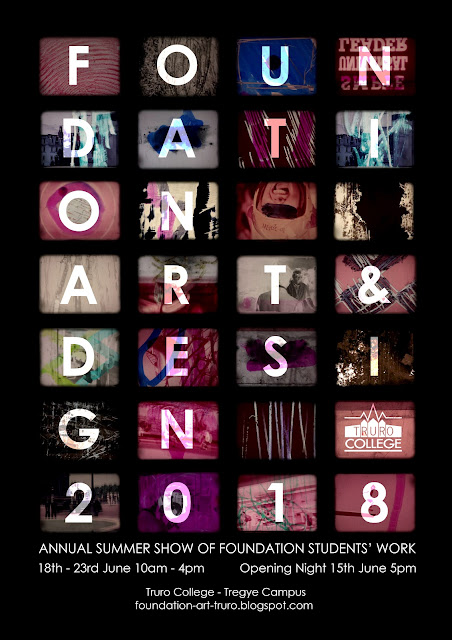Course Info
The Art and Design Foundation Diploma Course at Truro College has built up an excellent reputation over the years with our students progressing onto prestigious universities in the UK and overseas. This is an intensive one year course and the skills and ideas you develop here will stand you in good stead for your future career.
All lecturers are practising artists and provide students with a diverse range of skills and knowledge.
Critical and contextual studies is integrated throughout the course underpins student understanding in both contemporary and historical art and design. Students are helped and encouraged to develop individual creativity and to take risks in pursuing new and inspirational ideas. Students are taught a range of specific skills to facilitate these ideas, such as
 casting, screen printing, mould making, perspective drawing, creative computer skills, dark room
casting, screen printing, mould making, perspective drawing, creative computer skills, dark room
printing and digital photography and textile constructions.
Students never cease to amaze us with their ingenuity and originality and are given every opportunity to explore new possibilities as they become the artists and designers of the future.
Students progress onto many and varied degrees including some of the following, they can then find professional positions after completing their Degree, these include:
Fine Art - Painting, Sculpture, Installation
Graphic Design
Illustration
Interiors Design
Costume
Art and Art History
Architecture
Art Textiles
Fashion Design- shoe design, accessories
Product Design
Photography
Print making
Car Design
Curatorial practice
Contemporary Crafts
Model making for film production
(This list is by no means exhaustive)
Media or Photography
study defining their strengths in a particular specialist area
The pathway stage develops your skills within a specialist area. Students will focus on the distinct aesthetic issues and practices that affect the discipline. Work from this stage will constitute most of the portfolio which the students will present at HE interview
The Final Major project comprises the last stage; this requires the student to write a proposal within the chosen specialism, giving the opportunity to bring together all the research, creative and practical skills in the creation of a project which will reflect a personal ambition. This project will be exhibited and externally examined reflecting the final grade.
There are three assessment points:
All lecturers are practising artists and provide students with a diverse range of skills and knowledge.
Critical and contextual studies is integrated throughout the course underpins student understanding in both contemporary and historical art and design. Students are helped and encouraged to develop individual creativity and to take risks in pursuing new and inspirational ideas. Students are taught a range of specific skills to facilitate these ideas, such as
printing and digital photography and textile constructions.
Students never cease to amaze us with their ingenuity and originality and are given every opportunity to explore new possibilities as they become the artists and designers of the future.
Students progress onto many and varied degrees including some of the following, they can then find professional positions after completing their Degree, these include:
Fine Art - Painting, Sculpture, Installation
Graphic Design
Illustration
Interiors Design
Costume
Art and Art History
Architecture
Art Textiles
Fashion Design- shoe design, accessories
Product Design
Photography
Print making
Car Design
Curatorial practice
Contemporary Crafts
Model making for film production
(This list is by no means exhaustive)
Duration:
One year Full-timeSpecification or Syllabus:
ABC Awarding Body ConsortiumEntry Requirements and Student Suitability:
Most students will have completed an 'A' Level programme, National Diploma Art & Design,Media or Photography
Course Content:
The course will develop creativity in Art & Design through five pathways:- Graphic's
- Fine Art
- Textiles
- Photography
- 3 Dimensional design
study defining their strengths in a particular specialist area
The pathway stage develops your skills within a specialist area. Students will focus on the distinct aesthetic issues and practices that affect the discipline. Work from this stage will constitute most of the portfolio which the students will present at HE interview
The Final Major project comprises the last stage; this requires the student to write a proposal within the chosen specialism, giving the opportunity to bring together all the research, creative and practical skills in the creation of a project which will reflect a personal ambition. This project will be exhibited and externally examined reflecting the final grade.
Assessment and Coursework:
Assessment is entirely through course work. Students must pass each stage before moving to the next.There are three assessment points:
- Exploratory Stage, Assessed towards the end of Term 1
- Pathway Stage, Assessed at the end of term 2
- Confirmatory Stage, Assessed from the final exhibition


